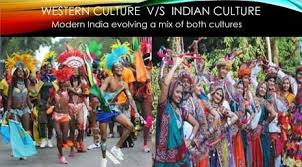Abstract:
 |
| Impact of Westernization on Indian Culture |
Christian maritime power in India brought Western civilization and culture with it and introduced many new elements in India's cultural heritage. The closing years of the eighteenth century of Indian culture were in a drought. Art had disappeared in fine arts, literature, science, philosophy, and religion. Intellectual life had become dull and dull. A society remained stable with all its evils. It was during this period that Western civilization and culture challenged all the old values and beliefs of India. As a result, old rites and customs, customs, and traditions declined. Social, religious, economic, and political institutions. Violently shaken the roots of national life. Impact of Westernization
In
this period of decline, Western culture attempted to create a framework on
Indian soil. It changed the vision and revolutionized those who came in contact
with the process. The immediate result was the indiscriminate imitation and
adoption of the western mode of life. Thus the influence of the West spread far
and wide among people of all classes in towns and villages.
 |
| Impact of Westernization on Indian Culture |
The
influence of West and English education was deeply felt on the literal
literature of India. Through the English language, Western literature was open
to Indians and the flood of ideas was let loose. Thus there was a great mental
expansion that European nations experienced when the English language was
introduced and taught.
Western
literature offered many magnificent specimens in various branches of literature
and was copied by Indian writers. In the means of literature, in the choice and
treatment of subjects, although they maintain a close connection with the
Indian ancient way of life, the best writers of Indian literature have a
Western sense of Western thought. Indian prose literature began with the interpretation of English prose
works. Indian
prose literature began with the translation of English prose works. Our prose
writers wrote essays in light of Western ideology. He copied the Western-style
and translated them into his writing. Even Rabindra Nath Tagore was no
exception to that effect.
Indian drama was heavily influenced by Western drama. The description of stagecraft
and projection of individual characters and social problems in modern Indian
drama is the result of studies of Western drama. Ibsen Galsworthy and Bernard
Shaw has been copied by Indian writers. The growth of one-act play in Indian
literature is a result of Western literary influence. Indian stories and novels
were also influenced by Western literature.
Poetry was also very impressive. The English
sonnet, strange, and blank verse poetry were copied. Madhusudan Dutt in Bengali,
Ayodhya Singh Upadhyay in Hindi has achieved amazing success in blank verses
influenced by Western culture. P. in Indian literature. Western scholars played
an important role in the creation of dictionaries and grammar. Christian
missionaries established the Indian oral press to spread the divine message of
the Bible. Later, Western scholars wrote the history of the Indian people to
establish its rapid growth and expansion.
Under the Western influence, several
Vernacular printing presses were established and several newspapers of Indian
languages were published. In 1780, Hickey began publishing the "Bengal
Gazette" in English. This was followed by the publication of the first The vernacular newspaper "Bengal Samachar" in 1816 and the"Bombay
Samachar" in 1822. The first Hindi newspaper "Banaras Newspaper"
was published in 1845.
 |
| Impact of Westernization on Indian Culture |
Indian-language newspapers and
magazines made close contact with many countries of the world and had the
opportunity to study literature and learn about our social, political, and
religious evils. Provided With the result, we may be able to do a comparative
evaluation and rejuvenate our ideas from a world view.
Our ancient language Sanskrit was
restored to us through English. Colebrooke, Wilson, James Prince, Max Muller,
and other scholars began studying, editing, and publishing Sanskrit works and focused
the attention of Indians towards the rich heritage of their Sanskrit
literature.
Impact on Politics:
In the field of politics, Western
thought and administration have taught us the concept of political unity and
constitutional law. It also preached the gospel of freedom and equality.
Western thought has promoted a sense of deep nationalism, political
consciousness, and aggressive nationalism in India which has greatly influenced
the course of Indian history. We were inspired by intense nationalism from
Washington, Cromwell, Mazzini, Garibaldi, and Napoleon, etc. Political
awakening and increasing nationalism united heterogeneous elements in our
country.
The increasing emphasis on democracy
and the institution of local self-government in India on account of the uniform The British administration, political unity, universal peace, constitutional
development, and the spread of Western political ideas. The thrust of
institutional democracy generated the idea of discontent among Indians in the soil of India.
Ethics, middle-class people are
restless to air their grievances against political subordination in light of
Western political ideologies of socialism, individualism, and humanitarianism. This
threatened the political spread of British imperialism.
 |
| Impact of Westernization on Indian Culture |
Impact on Indian Society:
There was a silent revolution in
Indian society. The conflicts between conservative and reactionary and
progressive Indians started there. The conservatives were in favor of the old
traditional way of life and shouted against the encroachment of Western
culture.
On the other hand, progressive groups
of Indian society have found untouchability, non-equality, the backwardness of
women, child marriage, Parda system, illiteracy, polygamy, and Devadasi system, etc. and influenced people to accept the good things of the West.
This has awakened the social
consciousness and helped in the development of the middle classes. He was
generously honored in the aristocracy and royal system. In these ways, the
conservative elite rallied around the British. With their effort, many social
evils can disappear quickly.
A new life and conduct in Indian
society were introduced by the West. The younger generation has accepted the
individualist view that is meant to loosen our social bonds. The institution of
a joint family and caste system has received a very rude shock.
The
influence of the West was beneficial to remove our social evils. The
inspiration for social reforms is drawn from the West. Freedom of womanhood
from the shackles of social tyranny became possible due to the influence of The western way of social life.
 |
| Impact of Westernization on Indian Culture |
Impact on Indian religion
and philosophy:
Western
culture and civilization brought radical changes in the field of religion. The
power of logic replaced superstition. Conservatism was a product of independent
thinking. A new concept of religion appeared in the light or Western
rationalism. Hinduism appeared in a bundle of superstitions and began to adopt
Christianity and assimilated many Western ideas. They began to study the Bible
and follow its principles.
A revivalist group rose to prominence. Religious reforms and saints such as Raja
Ram Mohan Roy, Swami Dayanand Saraswati, Swami Vivekananda, Sri Aurobindo, and
many others arrested the development of Christianization in India. Indian
philosophy greatly changed from Western philosophy's ideas of materialism,
realism, and idealism. It created an intellectual format among the educated
classes.
European
missionaries propagated the ideas of Christianity. The missionaries converted
to Christianity in considerable numbers and formed a new class or group within
the existing socio-religious structure of India. This created a deep feeling
among Hindu intellectuals exploring the intrinsic origins of Hinduism and the
concept of monotheism. Christian thought influenced traditional Indian society
to have a fresh look at its set of values.
 |
| Impact of Westernization on Indian Culture |
Indians'
interaction with Western civilization made them realize that scientific
inventions are at the core of the amazing progress of the West. Indians had
learned the spirit of inquiry through progressive approaches to rationality and a scientific approach to problems.
Western
scientific inventions influenced educated Indians to make proper arrangements
for advanced study of science in Indian educational institutions and
universities. Many advanced institutes dealing with scientific research have
been established in different parts of India.
Impact on Fine Arts:
It
is the West that has restored our ancient fine arts and made us aware of the
glorious past of our land. European scholars like Sister Nivedita, Havell,
Fergusson, and Stuart, etc. have told the world about the salient features of
India's fine arts. Percy Brown, Smith Tool, Max Muller, and many others have
contributed to monumental works on the greatness and pride of our past.
He
told us about Indian epigraphy and archeology. Many excavation works were done
by European scholars. All these have inspired us to scientifically write the
consciousness of the value of our art and the authentic history of India.
Impact on the Indian
Economy:
 |
| Impact of Westernization on Indian Culture |
The
West has changed the Indian standard of living based on a deep sense of
satisfaction and spirituality. Hereditary occupations can no longer guarantee
personal subsistence or comfort. New types of employment and castes came into
existence. The economic and industrial policy of the British destroyed India's
ancient village-based indigenous industries. Its traditional economic structure
in agriculture and industry was torn to pieces.
But
due to the increasing population and lack of new large-scale industries,
agriculture may not be a sound means of livelihood for the people. Close
contact with Western countries can adequately understand the modern industrial
way of life of Indians and the availability of minerals and raw materials for
the industrialization of their country for the development of their economy. Thus
the economic life of the country was bound to be modern.
The
new western ideology has changed our economic outlook, introduced the desire
for freedom, a passion for social justice in the field of economy. A new demand
for modernization for all avenues of progress in the field of industries and a
different kind of national spirit-based economic growth thus came to reclaim
the hope of economic prosperity in modern times like Indian life. The legacy of
hardships in the economic sphere is reminiscent of the exploitative character
of Western culture.
Conclusion:
Western
culture has actually trained to establish the Indian mind. In fact, some went
so far as to attempt to create a new Europe on Indian soil. Fortunately, this
process was quickly arrested by the forces of the Renaissance. Undoubtedly
Western influence has left an indelible mark on almost every aspect of Indian
life.
European
thinking and European patterns have moved strongly between urban areas that
control the strings of Indian destiny. Institutions of zamindaris, politically
loaded casteism, communalism, regionalism is encouraged by the imperial rulers
of the West and thus become a bottleneck for progress.
Also, Read

